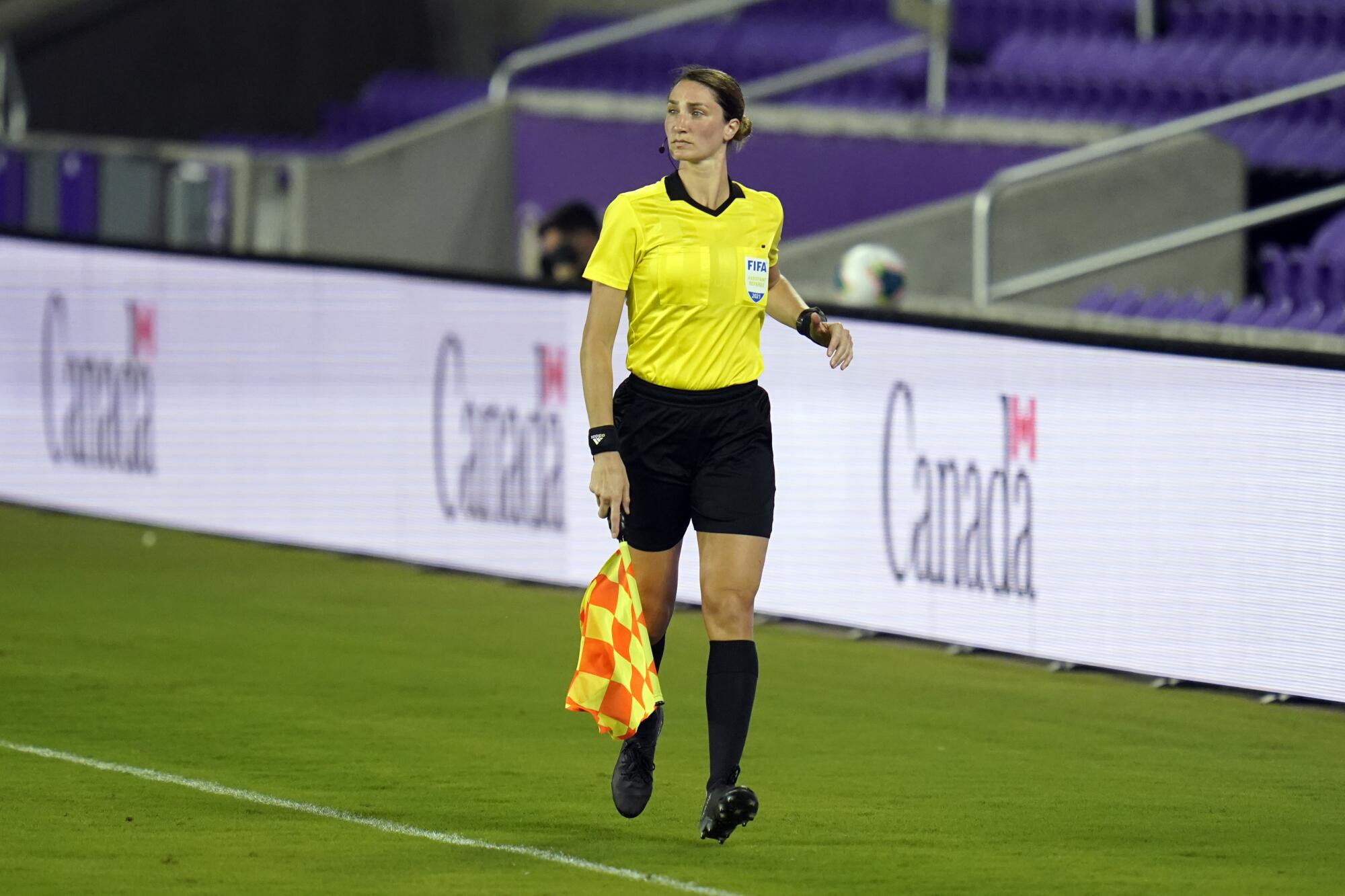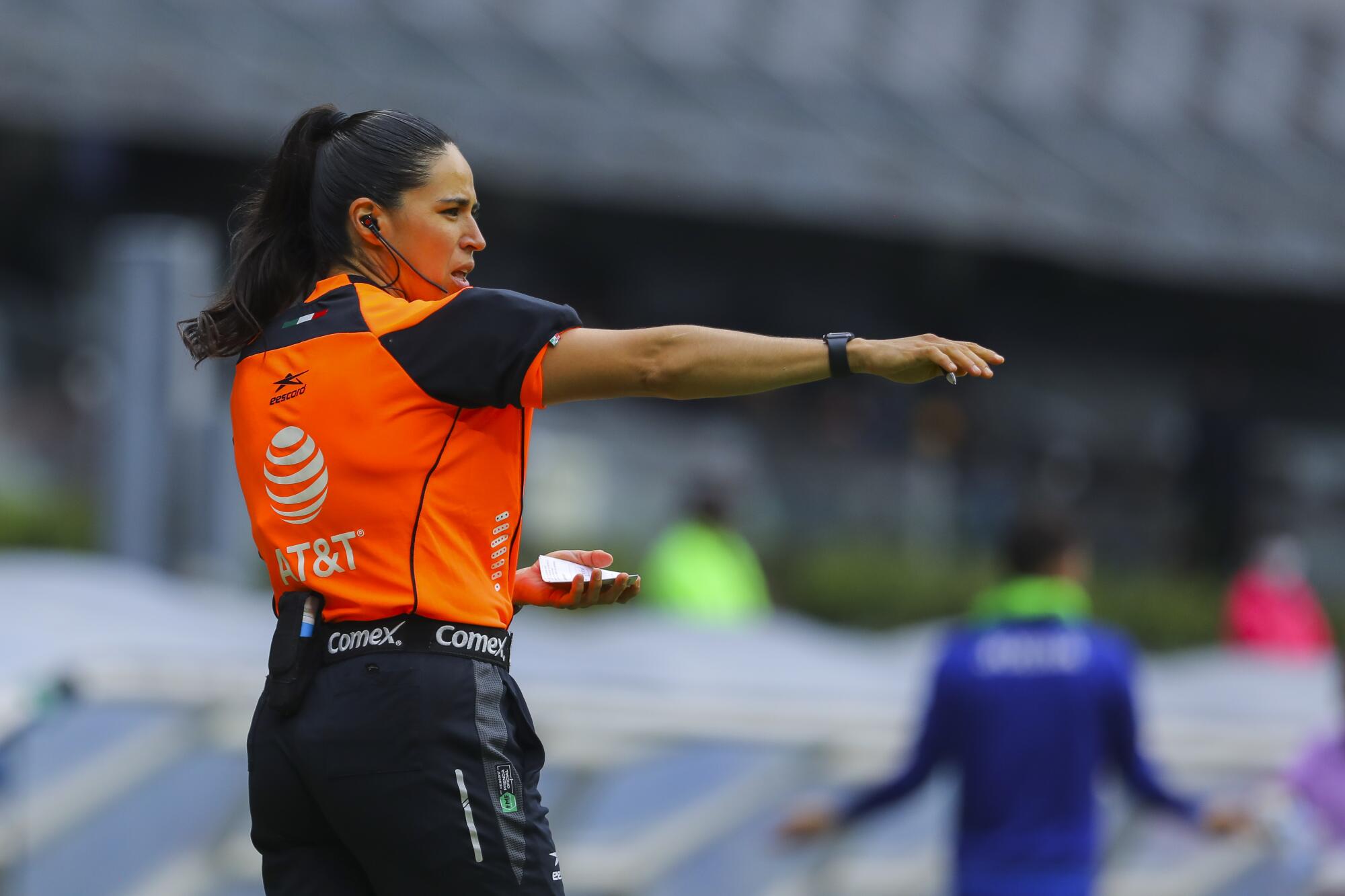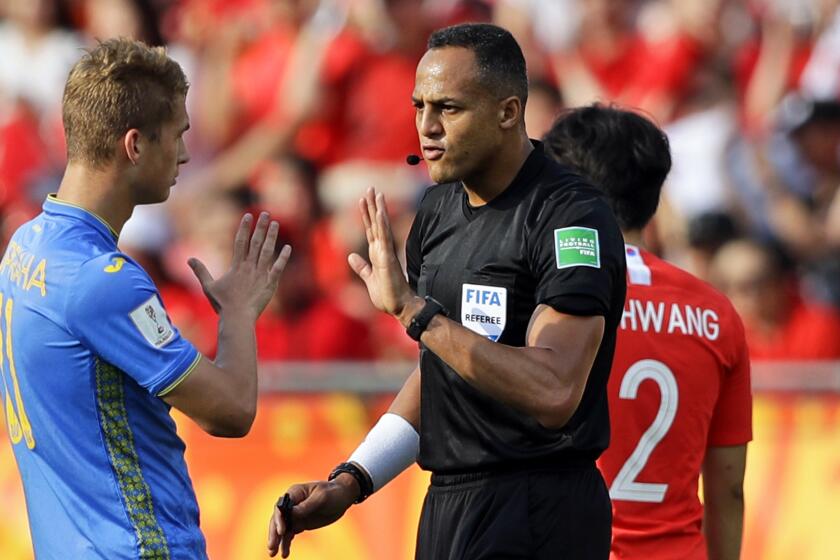
- Share via
DOHA, Qatar — In her old day job as an analytical chemist, Kathryn Nesbitt studied brain chemicals in an effort to learn how that organ worked. Trying to understand the origins of rational thought did her little good in her side job as a soccer official, however, because with FIFA rational thought has long been an oxymoron.
That might be changing.
For more than a century, FIFA, soccer’s global governing body, banned women from refereeing men’s matches, a policy that began to ease after the Bundesliga, the English Premier League, MLS and other domestic leagues allowed females to officiate their games, and they proved more than equal to the task. So two years ago, FIFA showed signs it, too, was becoming more enlightened when it put a woman, Brazilian Edina Alves, in charge of the club World Cup final.
But the World Cup? Surely that was another four years off, Nesbitt thought — right up until she got the call telling her she would be one of six women officials calling games in Qatar this fall.
“I never thought this could happen in 2022,” said Nesbitt, who three years ago quit her job as a professor and researcher at Towson University near Baltimore to devote herself to officiating full time. “This one wasn’t even on my radar. It’s a big deal in the sense that they were ready for this before anyone thought the world would be ready for it.”
It’s also a big deal for Kari Seitz, FIFA’s head of refereeing for women and the only referee of either gender to have worked four Women’s World Cups and four Olympic Games.
“This is a transformative moment in sports,” saidSeitz, who also was one of the first women to officiate MLS matches. “This big step will positively influence those who are still hesitant to give women the opportunities they deserve based on their qualities.”
The United States continues to improve its reputation on the world stage when it comes to soccer referees, but will one oversee the 2022 World Cup final?
Howard Webb agrees. The center referee in the 2010 World Cup final, Webb has spent the last five years as general manager of the New York-based Professional Referee Organization (PRO), which manages professional referees and assistant referees in the United States and Canada. During that time, he championed female officials such as Nesbitt, Tori Penso, Katja Koroleva and Felisha Mariscal.
“We’re seeing the rewards of that. Our percentages of assignments going to females in MLS is really, really good. It’s getting better all the time,” he said. “It shouldn’t need to be a conversation. There should be no difference between males and females.”
At the World Cup this month, there won’t be. The six women who are going to Qatar — center referees Yoshimi Yamashita of Japan, Stephanie Frappart of France and Salima Mukansanga of Rwanda and assistant referees Nesbitt, Karen Díaz Medina of Mexico and Neuza Back of Brazil — must pass the same fitness tests and are held to the same performance standards as their male colleagues. But Nesbitt said that hasn’t always meant they’ve been viewed the same.
“If a mistake is made, there will be more attention on it,” she said. “The thought process has always been you can’t mess up, which is kind of a scary thing to say. We are human, and we’re going to make mistakes.
“But the women that have come this far have been dealing with that pressure for years. We’re all very experienced with what that feels like and are ready for the challenge.”
“The women that have come this far have been dealing with that pressure for years. We’re all very experienced with what that feels like and are ready for the challenge.”
— Kathryn Nesbitt, on being a woman who will officiate men’s World Cup games in Qatar
Making it to a World Cup as an official is far more difficult than getting there as a player. Including video-replay officials, there will be 129 referees in Qatar, compared to 832 players.
“Going to a World Cup,” Nesbitt said “means that you are the best in your country and then the best in your confederation and then still, a small pool of the best officials in the world. It isn’t the step that happens for everybody.”
The officials arrived in Qatar for a training camp last week but won’t learn their group-play assignment until about 72 hours before kickoff.
How they do in that game will determine whether they go on or go home.
“Nobody is guaranteed anything at the World Cup,” said Nesbitt, 34. “We’ve been officially invited, but every day is tryout in my mind.”

Díaz, who celebrated her 37th birthday in Qatar, grew up playing soccer in the central Mexican city of Aguascalientes and was working in a cafe attached to a small stadium there when her boss asked for volunteers to referee a match after the assigned official failed to show.
“I raised my hand, and I enjoyed it. They paid me,” she said.
Now she will be one of the first women to officiate a men’s World Cup.
“When I was a little girl, I used to play football and my classmates would say, ‘Ay, you play like a man,’ ” she said in Spanish. “And now those characteristics that hurt me, those words that hurt me in that moment, now those are the skills that have helped me achieve my dreams.
“You never know what skills are hidden, so appreciate them. If you want to be a professional football official, follow your own path, accept it and fight with all your passion to achieve perfection and you will enjoy what you are doing.”
Alexis Lalas and Stu Holden played in World Cups before broadcasting them and say the jobs are remarkably similar. Fox Sports’ TV team has several ex-players.
Nesbitt started officiating soccer matches in upstate New York as a summer job when she was 14, fell in love with it and made her professional debut nine years later in the National Women’s Soccer League’s inaugural match in 2013. That was just one of many firsts in her career: first woman to be voted MLS assistant referee of the year; first woman to officiate a men’s championship game in any of the five major professional sports leagues in the United States; first woman to work a CONCACAF Champions League match; and first woman to leave her own research lab to become a full-time soccer referee, which she did two weeks before her first World Cup, the 2019 women’s tournament in France.
“Luckily, I’m able to publish a paper about once a year, and I’m trying to keep myself involved,” said Nesbitt, who is also the first World Cup referee profiled by Chemistry World magazine. “But at the same time, if I was going to say yes to everything I needed to say yes to, I wasn’t going to make it to a men’s World Cup.”
Now she’s there, meaning research into brain chemicals is going to have to wait a little bit longer.
“This is huge for women in refereeing and women in all sports,” she said of her selection and those of the other five women. “It’s been a process for sure, proving the value of female officials and proving our capabilities. The doors have started to open.
“This is going to be another example showing that we can do the work the same as the men.”









